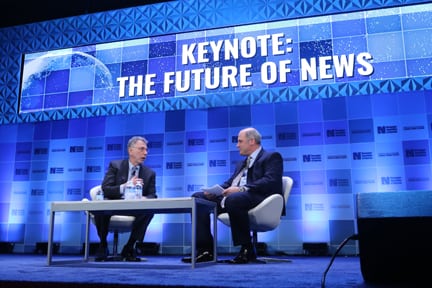 Watch: Full Session Video
Watch: Full Session Video
(member log-in required)
The Washington Post’s Executive Editor, Marty Baron, declared that the time for mourning is over.
“We have to understand the (media) industry is changing,” he said. “We have to be realists. We can’t go back to how it was. We may have mourned what we had but we must move forward.”
The start of NAA mediaXchange 2016 opened with Baron and moderator Trif Alatzas, Publisher and Editor in Chief of The Baltimore Sun, talking about the “Future of News.”
And the outlook is optimistic, according to Baron. He acknowledges the challenges but says the experimentation and advances in technology will provide the answer.
“You cannot go into work thinking what you’re going to do is going to fail,” he said.
At The Washington Post, Baron and his colleagues focus on trying new things, from blogs to alternative story forms. They have an overnight team that develops stories from 10 p.m. to 6 a.m. They focus on using social media as a regular source of stories.
“It’s like standing at the water cooler all day,” he said. “Nobody talks at the water cooler anymore; you can’t even find a water cooler anymore. But you can listen to where the conversation is, and that is social media.”
Baron is one of many trying to master how the web and mobile will play into the world of journalism. But journalists have mastered new frontiers before, and the new platforms will only improve how we share stories, he said.
He recommends writing in a more conversational tone to make a connection with the reader. Tools like video allow newspapers to put the viewer on the scene, and social media allows community engagement. Baron called for more investigative reporting.
“I am concerned people have run away from journalism,” he said. “And I use journalism because it has more meaning. Journalism means we get to the bottom of a story. Content is picking up an iPhone and taking a picture, anybody can do that.”
Baron’s Spotlight project was an Academy Award winning movie. He said it started out as a local story, and that all communities have stories like that that need to be told. The mission of journalists is to know what is happening in their community and tell those stories.
He wants those stories told in new and interesting ways. When questioned if young people have a lack of interest in the news, he disagreed. It is not a lack of interest or intelligence that is keeping millennials away from newspapers. He says 40 percent of The Washington Post readers are millennials.
“News for young people is not news for dummies. They are smart, they are engaged, they want to have a conversation,” he said. “They just might not come to us to get their news.”
To Baron, the single biggest challenge facing journalism is people believing false news and perpetuating these stories. He referenced the birthers, choosing to believe President Obama was not born in the United States despite proof.
“Story telling needs to change,” he said. “We need to have real, honest conversations.”

Contributing writer

